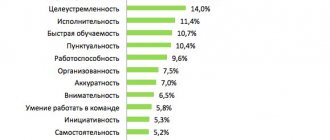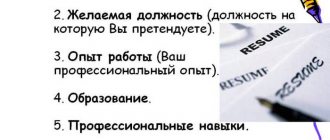More and more companies are starting to realize how important soft skills are and how costly it is to ignore them. A recent Adecco Staffing survey found that 44% of managers said a lack of interpersonal skills was the biggest training gap they saw among workers.
Companies are tired of being burned by candidates who look great on paper but can't prove their competence in the real world. They adjust their hiring criteria and strategies accordingly.
Another report from the International Association of Administrative Professionals, OfficeTeam and HR.com found that 67% of hiring managers said they would hire a candidate with strong interpersonal skills even if his or her technical abilities were lacking. On the other hand, only 9% would hire someone with strong technical skills but weak communication skills.
Why is it important?
If you want to get a job at an amazing company in today's market, you need to know how to sell your interpersonal skills. And this is not always an easy task!
Anyone can go and take a course to learn how to use the tool or read a book about the process. It seems light and tangible. But it's much harder to develop your emotional intelligence or improve your ability to persuade people, isn't it?
This is where the good news comes in. Like hard skills, soft skills can be trained, developed and mastered. To do this, you just need to follow the right steps!
The purpose of this post is to show you what employers care about soft skills in today's job market and how you can enter the market and effectively develop them.
We're going to cover:
- Definition of soft skills - what are they and why are they important?
- Why soft skills are important when hiring in today's job market
- Difference Between Hard and Soft Skills (20 Examples of Each)
- The 20 Most Important Soft Skills for 2022 and 10+ Examples for Each
- How to Train and Develop Interpersonal Communication Skills
- The Right Way to Add Your Soft Skills to Your Resume
By the end of this article, you'll know everything you need to know about soft skills so you can use them to land a great job offer.
What are soft skills?
Soft skills (or “soft skills” as they are also called) are “people skills” that almost every employer needs, but they are usually listed directly in the job description. We typically define soft skills as teamwork, communication skills and a positive attitude.
For managers, desirable soft skills include things like business etiquette, public speaking, presentation skills, adaptability, self-control, optimism, communication, accountability, honesty, self-motivation, collaboration skills, patience, enthusiasm, confidence and overall professionalism.
Soft skills are the side of emotional intelligence: social and people skills. This is your ability to work according to generally accepted norms, to be sociable and to have people like you.
Definition of soft skills
Definition of soft skills in the Collins English Dictionary:
“Desirable qualities for certain forms of employment that are independent of acquired knowledge include common sense, people skills and a positive, flexible approach.”
While this definition focuses solely on people skills and emotional intelligence, some definitions extend to all attributes of a personal career, including time management, leadership skills, personal habits, and language skills.
Essentially, a complete list of soft skills includes all the habits and social preferences that make it easy to work and be an effective employee.
Soft skills complement “hard skills” (technical competencies and knowledge required for a specific job function). While hard skills are easy to determine from your education and work experience, soft skills are a little more difficult to determine from a resume.
Knowing your own skill set will be vital to informing your resume and throughout the interview process.
Control
The necessary managerial knowledge and skills of a manager include the concept of control. Sometimes this term is mistakenly perceived as the responsibility of the manager to check every step of the performer. But such an approach is more likely to harm the motivation of employees - they feel distrust and subconsciously begin to sabotage processes.
Instead, try to think of control as the ability to organize a seamless system for tracking results. For example, a task can be divided into stages, set milestones and explain to employees what results you expect and on what day.
Why are soft skills so important when it comes to getting a job?
Soft skills are very important to get a job because they make up 50% of your interview. This means that half of your interview is focused on whether you have the technical skills to do the job, and the other half is actually about how you are a cultural fit with the team they already have.
Remember that most recruiters are taking a chance on finding someone with good interpersonal skills rather than a highly qualified candidate who is weak in this area.
Your potential employer wants to know if you get along with everyone. Your interviewer will pay attention to whether you are naturally happy and positive, and whether you bring something positive to the company.
They ask themselves two things:
- “Do I really want to spend 40+ hours a week with this person?”
- “Can this person build relationships with internal stakeholders and clients?”
Your soft skills also impact your ability to perform in an interview and build a relationship with someone. At the end of the day, people want to hire people they like, know and trust. These skills are key to creating a positive impression with your employer.
If you're looking at management positions, the employer wants to know that you have management skills and all the other soft skills needed to manage the many personalities on your team.
If you work in customer service or in sales, you need to have the soft skills to build relationships with clients, find leads, and build the relationships needed to convert them into clients.
The importance of soft skills
If you're an account manager, you need soft skills so you know how to build trusting relationships with different clients, all with different needs and personalities. This is done so that in the end you will be an effective employee and the company will be successful.
If you are a support specialist, you need to be able to manage relationships with both the client and internal representatives. You need to balance these relationships.
If you are a developer, you need to work with other developers and your manager.
And whatever you do, you need to work with customers and other staff within the company. Building strong relationships is how you are going to get the job done quickly.
Soft skills are the key to becoming more productive in business, as well as the key to your personal growth.
You're more likely to get promoted if you've built relationships with people who can promote you. Your soft skills will also help you expand your network and land your next job. Your soft skills are the key to opening the door to an interview as they are highly valued by employers and are also what shows the interviewer that you are a great fit for the role.
Conversely, lack of interpersonal skills may result in you not getting the job at all. Lack of these skills is also a key reason why many people quit.
It has also been said that interpersonal skills are a major determinant of employability and life success in the 21st century. So, what are you waiting for? Include them on your resume.
Time management and productivity
I constantly think about time, because it is the only resource that we will never renew. Where can I get more time? Optimize your sleep time. Perhaps to feel healthy, instead of the standard nine hours, seven or eight are enough for you. Check it out! How to use time more efficiently?
- Make good use of your so-called “dead” time (at the computer or in front of the TV).
- Focus on high-impact activities (remember the 80/20 rule: 20% of tasks produce 80% of results).
- Focus on what will help you grow (reading, talking to inspiring people, working on goals).
Hard (hard) skills vs soft skills [20+ examples]
As I mentioned above, hard skills and soft skills are complementary skill sets, but it's important to understand the difference. Hard skills are technical skills and competencies with associated tools. These are objective, learnable skills needed for the job.
Hard skills include machine skills, software skills, languages, techniques, tools, specific processes. Everything you can learn by getting your degree, watching a study guide, or taking some training.
You will usually find a clear list of relevant job skills in the job description for the position you are seeking. Here are some examples of hard skills:
Examples of Hard Skills
- Human resources
- Photoshop
- Data analysis
- HTML
- Search Engine Optimization
- JavaScript
- Salesforce
- Flexible structure
- Modeling in Excel
- Google Analytics
- Book layout
- Product Management
- Mathematics
- Forecasting
- Accounting
- Media Marketing
- Product Design
- French
- CAD modeling
Examples of soft skills
Now that we've covered the basics of hard skills, let's look at specific examples of additional soft skills that can add value to your resume.
Forbes recommends thinking about all the transferable skills that can be useful in any job, such as critical thinking, collaboration, creativity and communication. These are the main skills that you want to highlight on your resume.
In fact, transferable skills were a huge part of my ability to interview at Google, Microsoft, Uber, and Twitter. As a biology major, I started my career in the medical field, but was interested in finding a job in digital marketing. Within two years I made my way into the technology field.
Knowing which soft skills to highlight for interviewers was critical to my success as I transitioned into the tech industry.
A study conducted at Eastern Kentucky University also found that the top soft skills of business leaders include honesty, courtesy, social skills, communication, flexibility, teamwork, responsibility, work ethic, positive attitude and professionalism.
Here are over 120 examples of the best interpersonal skills for your resume that employers value:
Examples of Honesty Skills
- Reliability
- Honesty
- Kindness
- Ethical
- Having high moral standards
- Focusing
- Do what's right
- Attentiveness
- Personal values
- Availability principles
Examples of politeness skills
- Business Etiquette
- Good manners
- Polite greetings
- Mercy
- Patience
- Apologies
- Respectfulness
- Telephone etiquette
- Gratitude
- Decency
Examples of Social Skills
- Humor
- Upbringing
- Sympathy
- Self-control
- Sociability
- Individuality
- Friendliness
- Open body language
Examples of communication skills
- Public speaking
- Clarity of speech and writing
- Nonverbal communication
- Presentation skills
- Listening skills
- Open-mindedness
- Giving and receiving feedback
- Sympathy
- Selecting a communication medium
- Knowing when to communicate
Examples of Flexibility Skills
- Readiness for change
- Adaptability
- Lifelong learning
- Learning ability
- Adoption
- Adjustability
- Versatility
- Improvisation
- Calm
- Focus on solutions
Examples of Teamwork Skills
- Cooperation
- Pleasantness
- Utility
- Support
- Cooperation
- Sympathy
- Persuasiveness
- Influence
- Conflict resolution
- Relief
Examples of Responsibility Skills
- Self-discipline
- Performance
- Integrity
- Accountability
- Diligence
- Virtue
- Resourcefulness
- Common sense
- Reliability
- Maturity
Work Ethic Examples
- Hard work
- Perseverance
- Hard work
- Commitment
- Productivity
- Efficiency
- Zeal
- Self-motivation
- Punctuality
Examples of Positive Attitude Skills
- Happiness
- Confidence
- Optimism
- Enthusiasm
- Courage
- Energy
- Courage
- Fearlessness
- Durability
Examples of Professionalism Skills
- Sophistication
- Credibility
- Valor
- Respectability
- Pragmatism
- Leadership
- Mentoring
- Conflict Management
- Gallantry
That was a lot of skill! While they are all great, they are not all created equal. Our research shows that employers are looking for specific skills in today's market, which means you can benefit from emphasizing them too.
Here is a list of the top soft skills that employers are looking for today:
Optimization
When tasks are planned, processes are organized, achievements and errors are under control, and employees are developing, it is worth doing optimization. Management is a large complex mechanism, in the construction of which any leader makes small mistakes. Analyze all processes and try to correct shortcomings.
The main questions to ask yourself are: how to improve the work system, reduce time and effort per unit of result. Being able to optimize processes is a critical management skill that will move you up in any leadership ranking.
Best examples of soft skills
- Leadership skills
- Effective Communication
- Business Etiquette
- Time management
- Emotional intellect
- Innovation and creativity
- Sympathy
- Teamwork
- Reliability
- Lifelong learning
- Motivation and initiative
- Confidence
- Honesty
- Positivity and enthusiasm
- Flexibility
- Building rapport
- Good Work Ethic
- Loyalty
- Resourcefulness
- Problem solving
Now that you have ready-made examples of basic interpersonal skills, you need to develop these skills (if you haven't already).
Education
Without constant professional development, a talented employee will quickly lose motivation, “average” workers will simply work the required number of hours, and newcomers will not be able to understand the profession and will not be able to improve productivity and quality of work.
An important managerial quality of a manager is to develop a professional. What's important here is this:
- Who to teach?
It is usually impossible to send an entire department to courses at once. Think about which employee's training will bring maximum efficiency. Is it worth investing in a “star” right now if he starts working 1-2% better, or is it better to improve the average level, and the quality will immediately increase by 20-30%? - What to teach.
Is it really so important for a manager to get an MBA now; perhaps his “soft skills” are less developed? Study the results of employee monitoring, note in which area each of them is developing worse, and correlate this with the quality of work. - How to teach.
It is useless to introduce only one format of education into a company - for example, force everyone without exception to engage in business games. The learning process should begin with analysis: try it, listen to the opinions of employees, compare them with the “before and after” results.
Learning is a constant process. But this is not only about gaining new knowledge and practicing it through practical cases. It is important to provide opportunities for learning on real projects. Plan your work so that people in new projects and tasks have the opportunity to make mistakes and correct them themselves - this is one of the most effective pedagogical tools.
How can I develop and improve my soft skills?
I mentioned a minute ago that hard skills can be learned. Does this mean that soft skills cannot be learned? Can you learn soft skills? Yes! Absolutely right.
While hard skills are known for being learnable and measurable, soft skills are typically viewed as something you either have or don't have. But it's not that simple.
Many soft skills can also be learned and you can definitely develop your soft skills over time.
Developing interpersonal skills to include on your resume is a really smart move if you're about to start looking for a job. Soft skills training is something you can learn about from books and articles, but it's actually more of an art than a science. You will need to familiarize yourself with the theory and practice.
You can read personal development books, take a facilitation course, watch YouTube videos about public speaking, listen to podcasts about building relationships, attend seminars on conflict management, check Instagram posts about motivation, read articles about time management. Whatever you want to improve on has probably been covered in every format imaginable.
However, this will require enough self-awareness to know what you need to work on and a willingness to go out and find out about it.
It is not enough to simply say that you have all the necessary interpersonal skills. You should be able to demonstrate these soft skills in an interview by establishing rapport with the interviewer. So you will need to practice.
You can't just read a book about how to have a great relationship and expect it to happen instantly. You really have to put the tips into practice.
It's like riding a bicycle. I could watch YouTube videos about riding a bike all day and then read a book about riding a bike, but until I get on a bike and start pedaling, I will never learn how to do it.
The same goes for teaching soft skills (imagine that!).
However, finding great books and courses to get started can't hurt.
Books to help develop soft skills
How to win friends and influence people (D. Carnegie) (well, you’ve probably read this one)
Negotiations without compromise. Negotiate as if your life depends on it. (Chris Voss)
Business etiquette from Emily Post. A complete set of rules for business success.
Is it necessary to refer to previous employers?
A positive reference from a previous place of work is a big plus. It would be great if at the end of the resume the contacts of the previous management are indicated, so that the potential employer or his representative can, if desired, receive at least one review. Or, as an option, a note indicating readiness to provide such feedback. But you need to ask about this in advance and get consent in the event of a possible call to briefly describe you as a specialist and a person. The mere fact of having contacts for recommendations will increase the chances of a positive decision and trust in the applicant.
And if you are not sure that your former boss will praise you, and you don’t know what to write in “skills” on your resume, try to look at yourself through the eyes of your former boss. Perhaps this will help you formulate your own professional strengths, analyze omissions and find the right balance.
How to list your soft skills on your resume?
You're probably looking at the huge list above and wondering how to fit it all on your resume.
When it comes to listing resume skills, there are several ways to approach it. The easiest way is to simply list all your skills in one section. It will probably be unreadable.
But wait, this shouldn't happen.
I always say that skills sections are best placed at the bottom of your resume or in the sidebar.
You only need to highlight a few key skills. So, if you were just highlighting soft skills, you could make a list like this:
- Leadership
- Presentation skills
- Mentoring
- Adaptability
- Time management
- Initiative
It's really effective to create bar graphs to make your skills stand out on your resume, and this goes for soft skills too.
See how I use graphs in my resume to highlight skills and you'll get a good idea of how to highlight your best skills:
Not so boring, right?
Next, you need to make sure you're mentioning the right skills. This is an attempt to attract recruiters to look at your resume.
75% of resumes come from online portals. The portals themselves typically sift through resumes on behalf of recruiters to ensure that only the most relevant resumes are presented.
Sounds pretty bad, right? What if I told you that this isn't the worst part?
At the end of the selection process, only 4% of resumes end up in the hands of a recruiter.
Here's a trick I use to make sure I know what skills the employer is looking for.
Take a job description, cut and paste the text into WordClouds.com, and you'll get a job description word cloud and a ranked list of words. Try using multiple job descriptions for the same position. Get something like this
Once you've collected all the information, it's time to put it to use.
Using WordClouds will allow you to clearly see which words are important to employers and which words are more likely to be targeted by applicant tracking systems (ATS). This is your key to getting your resume noticed in the first place.
I also highly recommend mentioning both hard and soft skills in descriptive sentences along with renewal words as a really easy way to stand out from the competition.
This method turns all your best examples into sentences that have real impact.
Whichever route you choose, your resume skills will be clear to potential employers without being a boring list. So what will you do?
Improving Your Resume: Beyond Soft Skills
Now you know what your soft skills and hard skills are and how to include them on your resume. Note that your soft and hard skills complement each other perfectly to create the perfect resume.
We live in an extremely competitive job market, and highlighting the skills you need makes it easier for employers to choose you. Don't forget that in order to stand out from the crowd, you will still have to use all your creativity and copywriting skills to get your resume noticed.
Don’t confuse the description of your abilities and personality traits
Punctuality, communication skills and responsibility should be indicated in the “About yourself” column. The “Skills and Achievements” column is needed only for information related to job obligations.
In the “Professional skills” section, you must indicate the basic skills acquired at your previous job or at a university. Here you can indicate your achievements. The section should reveal you as a specialist. In other words, this section should describe your “Qualifications”.
If you describe your skills, you will make your CV more attractive. After reading this section, the potential boss should clearly understand that the company needs you and you definitely need to be called for an interview. You need to attract him with your knowledge and abilities. If you want this to happen more often, listen to our advice:
- The “Qualifications” item should be placed exactly after the “Education” item. This is at least logical.
- This section must be modified for any new vacancy. You only need to record abilities that are suitable for the position you are looking for.
- You shouldn’t make yourself a one-man orchestra, carefully indicating the entire list of your advantages. Indicate a few (4-8) key ones, that's enough. If you want to express some skills, you will have to sacrifice others.
- Initially, describe those abilities that are most consistent with the position you are looking for.
- Write the list in a way that is easy to read.
- You need to use the same definitions and phrases used by the potential boss in the ad.
- When describing skills and abilities, you need to start phrases with the words “have experience”, “know”, “possess”, etc.
- There is no need to write about your features; there is a special section for them in your resume.
Attention: so-called “headhunters” are looking for rare employees. They are generally not interested in the candidate's experience, they are looking for specific benefits provided to them.











